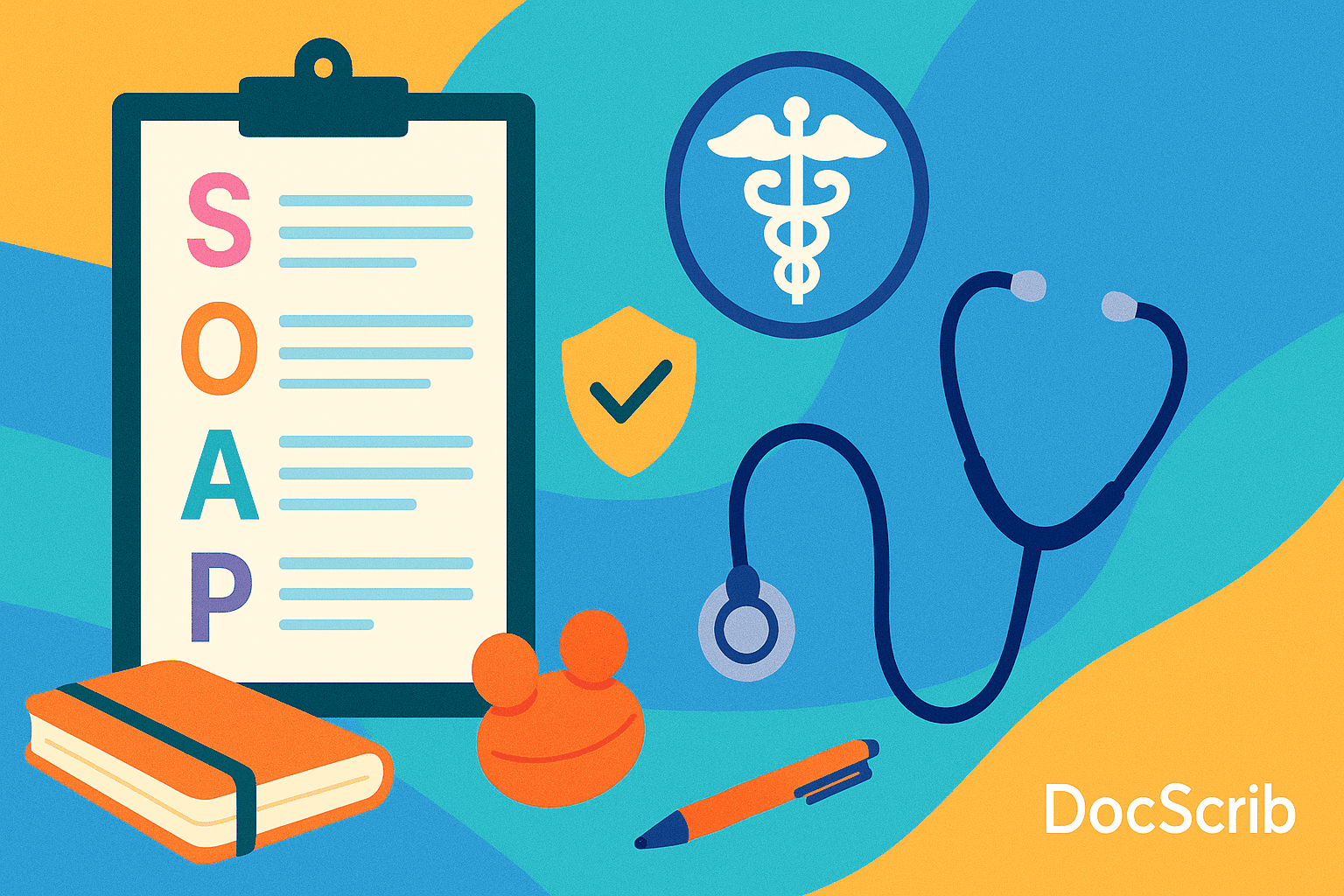Updated on: October 3, 2025
SOAP notes—Subjective, Objective, Assessment, and Plan—are the backbone of occupational therapy documentation. They capture patient progress, guide future care, and ensure compliance. For occupational therapists, however, writing detailed SOAP notes after each session can feel overwhelming.
That’s where a structured SOAP note template and AI Medical Scribe support from DocScrib can make documentation smoother, faster, and more reliable.
In this article, we’ll break down how to write effective occupational therapy SOAP notes, provide a sample template, and explain how DocScrib can help clinicians save time, reduce errors, and focus more on patients than paperwork.
Why SOAP Notes Matter in Occupational Therapy
SOAP notes are not just a formality. They:
-
Track Patient Progress – Documenting improvements or setbacks over time.
-
Ensure Communication – Provide other clinicians with a clear record of therapy interventions.
-
Support Insurance & Compliance – Detailed notes are required for billing and audits.
-
Guide Future Care Plans – Notes inform upcoming sessions and therapy adjustments.
Without accurate SOAP notes, clinicians risk incomplete patient records, reimbursement issues, and miscommunication across care teams.
Breaking Down the SOAP Note Format
A SOAP note includes four key sections:
Subjective (S)
-
Patient-reported experiences, symptoms, or concerns.
-
Example: “Patient reports difficulty gripping utensils during meals due to hand stiffness.”
Objective (O)
-
Measurable data from observations or tests.
-
Example: “Range of motion in right hand: 50% of normal. Strength 3/5.”
Assessment (A)
-
Therapist’s clinical interpretation of subjective and objective findings.
-
Example: “Decreased fine motor control impacting daily self-care activities.”
Plan (P)
-
Next steps, frequency of therapy, and goals.
-
Example: “Recommend 3 sessions per week focusing on grip-strengthening exercises.”
This simple framework ensures that every note is structured, thorough, and compliant.
Sample Occupational Therapy SOAP Note Template
Here’s a free SOAP note template you can use in practice:
| Section | Example Entry |
|---|---|
| Subjective | Patient reports difficulty with dressing independently due to shoulder pain. |
| Objective | Observed limited ROM in left shoulder (90° abduction). Grip strength measured at 4/5. |
| Assessment | Reduced mobility and strength impacting ability to perform ADLs. Progress noted since last session. |
| Plan | Continue therapeutic exercises 3x/week. Introduce adaptive dressing aids. Follow-up in 2 weeks. |
This structure makes it easier for clinicians to communicate patient status effectively while keeping notes concise.
Common Challenges with SOAP Notes
-
Time Pressure – Therapists juggle multiple patients daily.
-
Repetitive Documentation – Many notes contain similar sections.
-
Risk of Missing Details – Rushed notes may skip important observations.
-
Insurance Rejections – Vague or incomplete notes can lead to denied claims.
This is where DocScrib’s AI-powered note generation steps in.
How DocScrib AI Medical Scribe Enhances SOAP Notes
DocScrib transforms occupational therapy documentation by:
-
Auto-Drafting Notes from Sessions – Converts therapist-patient conversations into structured SOAP notes.
-
Reducing Redundancy – Pulls forward repeated details from previous visits.
-
Improving Accuracy – Ensures compliance with billing and clinical standards.
-
Saving Time – Cuts documentation time by up to 70%.
-
Enhancing Patient Care – Gives therapists more time to focus on treatment instead of typing.
📌 Explore more about AI in Clinical Documentation.
Benefits of Using AI for Occupational Therapy SOAP Notes
-
Streamlined Documentation – No more starting from scratch for every session.
-
Consistency Across Therapists – Templates ensure uniform, high-quality notes.
-
Compliance-Friendly – Notes structured to meet payer and legal requirements.
-
Better Patient Outcomes – Faster documentation means more focus on care delivery.
-
Reduced Burnout – Less paperwork leads to improved work-life balance.
Traditional vs AI-Supported SOAP Notes
| Feature | Traditional SOAP Notes | AI-Enhanced with DocScrib |
|---|---|---|
| Time per Note | 10–15 minutes | 2–3 minutes |
| Accuracy | Dependent on clinician | AI-assisted, fewer errors |
| Compliance | Varies | Consistently structured |
| Clinician Workload | High | Reduced significantly |
Related Resources for Clinicians
Each of these builds on structured, AI-assisted documentation that complements SOAP notes.
Conclusion
Occupational Therapy SOAP Notes are essential for documenting progress, ensuring compliance, and guiding patient care. But they don’t have to be time-consuming.
With DocScrib’s AI Medical Scribe, therapists can:
-
Draft notes automatically from session data.
-
Maintain consistent, high-quality documentation.
-
Free up more time for patient interaction.
👉 Ready to simplify your SOAP notes with AI? Book a Free Demo with DocScrib
